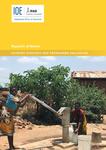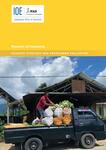Page Header
Kingdom of Morocco Country Strategy and Programme Evaluation
Overview
This is the second country strategy and programme evaluation carried out in Morocco by the Independent Office of Evaluation of IFAD (IOE). The report assesses the joint work of IFAD and the Government of Morocco from 2009 to 2020, covering 10 projects aiming to contribute to rural poverty reduction. The evaluation found that in the disadvantaged or isolated areas where IFAD was the main external development partner, the portfolio contributed to enhancing economic resilience, environmental sustainability and resilience to climate change among rural poor people. IFAD also effectively supported the improvement of individual and collective skills, by providing trainings and fostering the emergence of several farmers’ organizations. However, the farmers’ organizations established have not yet reached institutional and financial sustainability. The portfolio achieved insufficient results in terms of inclusive rural finance, and mixed results in relation to producers’ ability to access reliable and remunerative markets. While knowledge management activities were pursued, the capitalization on the lessons learned was not systematic and policy engagement activities were not proactive. For the future, the report recommends to continue interventions in disadvantaged areas with better targeting of women and youths, through the promotion of key value chains to complement territorial development initiatives, as well as to further strengthen grass-roots organizations to make them more effective and sustainable. In addition, the evaluation suggests improving knowledge management efforts in order to capitalize on the experience gained, and more proactive participation by IFAD in the formulation of agricultural policy and strategy in the country.Report Details
| Year Published | |
| Type | |
| Joint | No |
| Partner/s | N/A |
| Consultant name | A.Floquet - F. Dévé - L. Randrianarison - S. Edine Aboudi |
| Agency Focal Point | Kouessi Maximin Kodjo |
| Focal Point Email | k.kodjo@ifad.org |
| Managed by Independent Evaluation Office | Yes |
| Country/ies |
YOU 'RE READING
Kingdom of Morocco Country Strategy and Programme Evaluation











